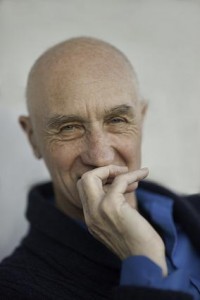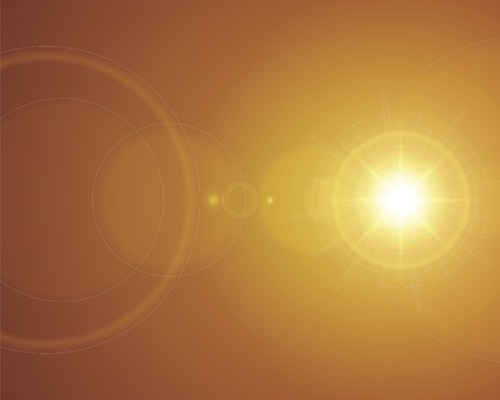
I’ve been an admirer of Roger Housden’s writing, especially Ten Poems to Change Your Life, for some time, and his new book, Keeping the Faith Without a Religion (Sounds True), did not disappoint. A slim volume at less than 150 pages, its length belies its depth. Housden’s erudition, sincerity, remarkable understanding of literature, and sometimes-unexpected yet always-apt associations between saints and scientists, poets and pundits, make this a book you’ll want to spend time with. It might even drive you to the dictionary (topia, numinous, purusha…) or the library (William Wordsworth and Gary Shteyngart, Job and the Buddha, Mary Oliver and Jack Gilbert, Carl Jung and Richard Feynman…)—and that’s a wonderful thing.
Housden asks the question, “What is faith?” and proceeds to investigate and illustrate the answers within his own experiences and the vast scope of his reading. He starts by distinguishing between belief—“mental acceptance of an opinion”—and faith—“a matter not just of the head, but of the heart,” which is “an awareness that is not passive or fatalistic, but actively engaged with and accepting of life’s twists and turns.” He then takes the reader on a journey, exploring many facets of trust along the way: trusting the knowing, the mystery, the dark, the joy, the change, the imperfection, and the letting go. This trust ultimately culminates in faith: faith in beauty, kindness, and love, with the human spirit ultimately recognizing that committing to fully realizing our shared identity with all beings “is to keep the faith by knowing that although there are no guarantees for the future, humanity is worth loving, worth working for and praying for, no matter what.”
Housden takes the reader beyond dogma and nihilism, looking into the place science can’t quite reach, contrasting it with the fundamental humanity of religion, and drawing conclusions that give purpose to his book. “Unlike religion and atheism, the faith that lives in the heart transcends our mania for conclusions,” he writes. “Science is able now to tell us a great deal about what we are and an increasing amount about where we came from, but little if anything about who we are. For many neuroscientists, consciousness research is becoming the holy grail, the great undiscovered continent.”
He goes on to say, “I don’t know what this mystery we call life is, but to reduce it either to the observable universe of science…or some external religious code of belief…would not allow for my own subjective experience, however unreliable it may be, or that of countless others through history.” He illustrates his point using the teachings of sages from Rumi to Teresa of Avila, Ramakrishna, and Tagore, but he advises that you don’t have to be “religious to experience transcendence, to experience ‘the Mystery.’ You just have to be human. If you are human, you can’t help but wonder.”
In the following excerpt, Housden shares an extraordinary experience from his life as an invitation to trust the changes in our own, no matter where they may take us.

My memory is not what it was. My face is not what it was. My partner tells me I snore now, which I never used to do, but I don’t believe her. I am changing before my eyes. I didn’t used to look like this, but then they don’t make mirrors like they did. Fall has come early this year; I was just getting around to enjoying summer. Before we know it, winter will be rattling the windows. I’m in a relationship again. I rather liked the bachelor life, but this suits me better. My earlier marriages have gone the way of all things. I am going the way of all things. Three years ago, I had money. Now I have no money. This morning I was peaceful, at lunch I was impatient, this afternoon I was joyful, and later I was irritated. And tomorrow will not be a repeat of today, nor will next year be like this one. We are walking all of us into the glorious unknown of the rest of our lives. Only two things are certain: it will keep changing, and sooner or later, it will end.
Change happens in every moment—not just in the events of our lives, but also in the cells in our bodies, in our thoughts streaming by, in our moods shifting with the tides, even in our sense of who we are and where we are going. Sometimes we ache for change and sometimes we dread it. We harbor notions of what is good for us and what is not, and we try to organize and strategize accordingly. We like to be in control.
To trust the changes does not mean that we trust them to turn out the way we would like. It means that we can absolutely trust that changes will happen, and that they’re not personal. That’s simply what life does: it changes—often in small ways, sometimes as dramatically as a ride on a roller coaster. If we have the requisite bandwidth of awareness, we can also trust that what comes and goes does not define the essence of who we are. The true value of change is precisely that it can loosen our grip on the way we want things to be and open us to the Knowing that is beyond all change.
Change can usher in a new life. It hardly needs to be dramatic in the way my Tehran experience was. People like me may need a hammer to break through their encrustations, while others need only a feather. It may simply require looking up one day instead of down and suddenly seeing, for no reason, the world and oneself through a different lens.
For the next two days, they questioned me over and over on my reasons for being in Iran and made it clear they considered me a spy. They also showed me that they had listened to every phone call and seen all my emails. They slept round my bed and continued with their questions as soon as I had woken. Finally, they said I had the choice of either going to Evin Prison for several years or agreeing to work for them. They wanted me to report on the activities of foreign nongovernmental organizations in Iran. If I agreed, they would let me go. I agreed. They left the room, saying they would be back in five minutes.
They didn’t come back for an hour or more, and in that time I could feel the story of my life as I knew it slipping away. For all I knew, I would never see the outside world again, my friends and family, or the city I had grown to love, San Francisco. I would perhaps never write the book I had come to Tehran to write. And yet the strange thing was, I was not afraid. Something in me began to see my life’s story for what it was—as just that, a story. If the story was interrupted, another story would inevitably take its place—prisoner in Tehran, wrongfully accused of spying—until all stories ended with my death.
But in the meantime, I became aware, as I had never quite done before, of an aliveness, a quality of being, that was silently humming along all the while, whatever story it might be cloaked in. In that moment I knew for certain, and not with my thinking mind, that whatever changes my story might go through, I would continue to be a living, breathing presence of aliveness that permeates all my days.
It wasn’t that I didn’t care what happened. Of course I cared. I wanted to be on the next plane out. But the question of what the future might hold no longer weighed on me like a dark cloud as it had begun to do when the security agents first left the room. Something had lifted. Recognizing that I was utterly helpless and unable to do anything to change my circumstances, something in me let go. I let go of all hope, all despair, and all struggle. I gave up. And that was when I felt as alive and present to the world as I had ever felt. In that hour, the Iranian security service gave me the gift of a taste of freedom.
Evidently, I returned to tell the tale. My familiar story continues, and no, I do not work for the Iranian security or intelligence services. Neither do I always live today at the frequency I realized in that hotel room in Tehran. But it left its mark on me, and though everything appears the same, I inhabit differently somehow—more lightly, perhaps, though I can’t count on it.
Change can usher in a new life. It hardly needs to be dramatic in the way my Tehran experience was. People like me may need a hammer to break through their encrustations, while others need only a feather. It may simply require looking up one day instead of down and suddenly seeing, for no reason, the world and oneself through a different lens.
All the same, when you are ready, you begin. The action unfolds out of the clarity and stillness of a knowing heart. In that stillness, there is nothing to do but to trust the change, wherever it takes us; nothing to do but walk right down the middle between hope and fear into the wow of the life that is waiting for us, whatever it may be.
Adapted from Keeping the Faith Without a Religion, by Roger Housden. Copyright © 2014 by Roger Housden, with permission from Sounds True, March 2014.




2 Comments
Jeri Parker
“. . . the wow of the life that is waiting.” It doesn’t get any better than this. Beautifully written review.
Beth Adams
I agree, very beautifully written review and amazing story!